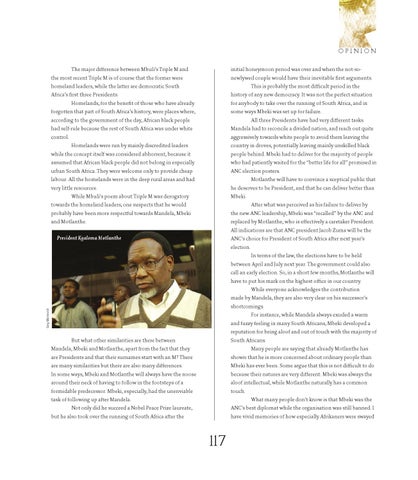OPINION The major difference between Mbuli’s Triple M and the most recent Triple M is of course that the former were homeland leaders, while the latter are democratic South Africa’s first three Presidents. Homelands, for the benefit of those who have already forgotten that part of South Africa’s history, were places where, according to the government of the day, African black people had self-rule because the rest of South Africa was under white control. Homelands were run by mainly discredited leaders while the concept itself was considered abhorrent, because it assumed that African black people did not belong in especially urban South Africa. They were welcome only to provide cheap labour. All the homelands were in the deep rural areas and had very little resources. While Mbuli’s poem about Triple M was derogatory towards the homeland leaders, one suspects that he would probably have been more respectful towards Mandela, Mbeki and Motlanthe.
initial honeymoon period was over and when the not-sonewlywed couple would have their inevitable first arguments. This is probably the most difficult period in the history of any new democracy. It was not the perfect situation for anybody to take over the running of South Africa, and in some ways Mbeki was set up for failure. All three Presidents have had very different tasks. Mandela had to reconcile a divided nation, and reach out quite aggressively towards white people to avoid them leaving the country in droves, potentially leaving mainly unskilled black people behind. Mbeki had to deliver for the majority of people who had patiently waited for the “better life for all” promised in ANC election posters. Motlanthe will have to convince a sceptical public that he deserves to be President, and that he can deliver better than Mbeki. After what was perceived as his failure to deliver by the new ANC leadership, Mbeki was “recalled” by the ANC and replaced by Motlanthe, who is effectively a caretaker President. All indications are that ANC president Jacob Zuma will be the ANC’s choice for President of South Africa after next year’s election. In terms of the law, the elections have to be held between April and July next year. The government could also call an early election. So, in a short few months, Motlanthe will have to put his mark on the highest office in our country. While everyone acknowledges the contribution made by Mandela, they are also very clear on his successor’s shortcomings. For instance, while Mandela always exuded a warm and fuzzy feeling in many South Africans, Mbeki developed a reputation for being aloof and out of touch with the majority of South Africans. Many people are saying that already Motlanthe has shown that he is more concerned about ordinary people than Mbeki has ever been. Some argue that this is not difficult to do because their natures are very different. Mbeki was always the aloof intellectual, while Motlanthe naturally has a common touch. What many people don’t know is that Mbeki was the ANC’s best diplomat while the organisation was still banned. I have vivid memories of how especially Afrikaners were swayed
Greg Marinovich
President Kgalema Motlanthe
But what other similarities are there between Mandela, Mbeki and Motlanthe, apart from the fact that they are Presidents and that their surnames start with an M? There are many similarities but there are also many differences. In some ways, Mbeki and Motlanthe will always have the noose around their neck of having to follow in the footsteps of a formidable predecessor. Mbeki, especially, had the unenviable task of following up after Mandela. Not only did he succeed a Nobel Peace Prize laureate, but he also took over the running of South Africa after the
117 man_tripleM03.indd 5
12/3/08 11:46:53 AM
